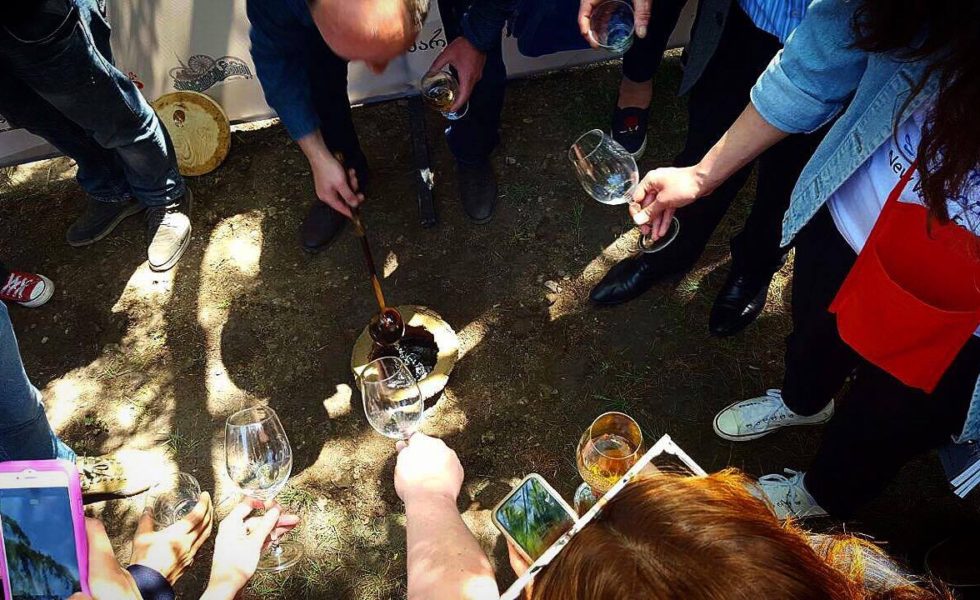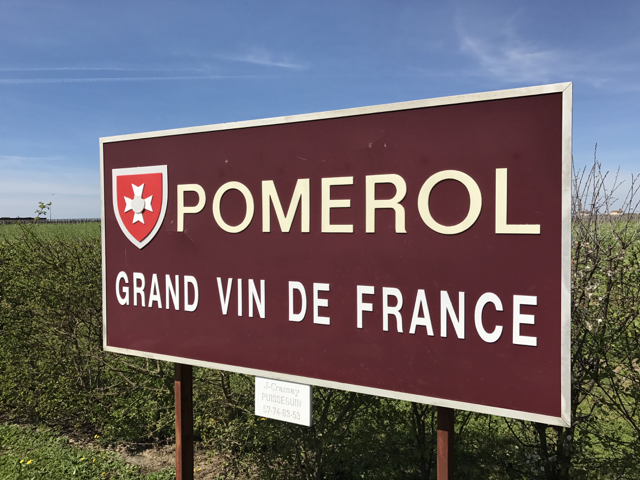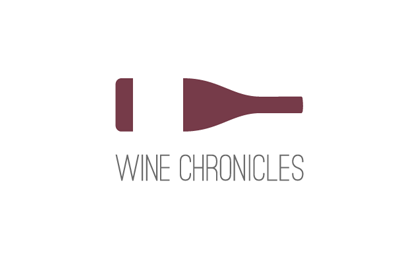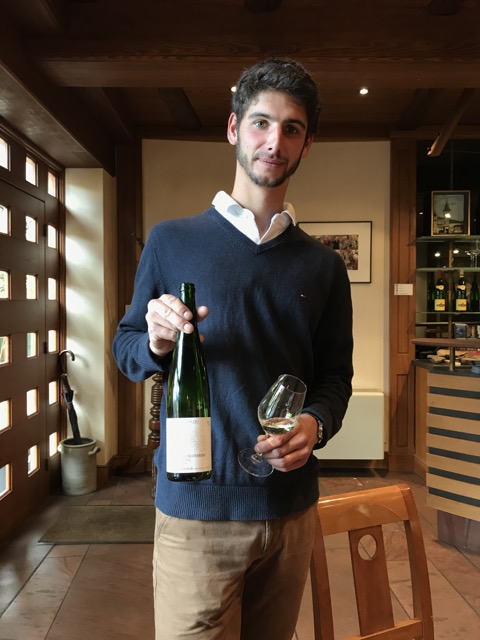Celebrating Georgian wine
Posted on June 12, 2017

News from the 8th annual New Wine Festival
By Sarah May Grunwald for wine-chronicles.com
(Opening of qvevri photo, above, by Bruno Almeida, sommelier)
12 June 2017
The eighth New Wine Festival, annually held by The Georgian Wine Club, took place on Saturday, May 13th at the Mtatsminda Park, a famous landscaped park located at the top of Mount Mtatsminda overlooking the Georgian capital of Tbilisi.
The occasion? A yearly celebration of local wine and culture, with local musicians, and nearly 200 wine producers pouring 2016 vintage wines.
The festival is much more a cultural event, despite its wine roots. I attended with a group of journalists and wine professionals. We decided to arrive as early as possible because we were warned that, as the day went on, the festival would turn more into a big, crowded party rather than a wine tasting event. We were greeted by the always-professional Iago Bitarishvili, who gave us a short description of the event, glasses and a booklet with information on the many participating producers. Read More
Pomerol power in 2016
Posted on May 30, 2017

By Panos Kakaviatos for wine chronicles.com
30 May 2017
Last year’s Pomerol Panache is followed by more serious tannin this year.
Whatever the case, Pomerol now has a run of three excellent vintages in a row. With some exceptions, 2016 is the most powerful among the three – more Pauillac than Pomerol. 2014 showcases brightness, and 2015 more inviting richness.
Tannic seriousness was best evidenced tasting through the Moueix stable, culminating in a Château Trotanoy that is more muscular than ever. By the same token, Vieux Château Certan was the most forebodingly powerful that I can recall from barrel. Petrus hit the scales at nearly 15% alcohol; it too, packs particular punch. Lafleur’s lofty, towering structure resembles that of Pauillac first growth Latour.
So in 2016 for Pomerol, more often than not, the tannins impose, although the best estates managed to include, too, much elegance, floral aspects and sumptuous charm.
In reading fellow critics, I agree with Jeff Leve, who “gives the nod” to 2015 for the appellation, on a general level. As he wrote in his review: “2016 is not a weaker vintage; 2016 Pomerol is just different.”
For me, the difference lies in the tannic power for so many of the 2016 Pomerols. Many will likely last longer than 2015, but will they convey the same charm as 2015? I am not an optimist. Crystal ball prognostications are as reliable as Greek trains being on time, however, so seeking Pomerol in 2016 would make for a wise choice, as the appellation features some of my top 2016 wines, as you can read in the Top of the Pops section. Read More
Critics Challenge International Wine & Spirits Competition
Posted on May 26, 2017

Taking part in an international wine competition in San Diego
26-28 May 2017 in San Diego
Many thanks to friend and chief judge Robert Whitley, for the opportunity to judge this weekend for the Critics Challenge in San Diego. I am honored to be a part of a panel of great wine connoisseurs.
Robert writes the syndicated Wine Talk column for Creators Syndicate. He and I agree totally that the Médoc excelled in particular for #Bordeaux16; here his excellent post. It is always a great pleasure to meet Robert in Bordeaux during en primeur or at Vinexpo. It will be great to meet again in San Diego these next three days!
Robert also is publisher of the online wine publication WineReviewOnline.com. His columns covering wine and spirits over the past 25 years have appeared in newspapers and magazines from coast to coast, and he also contributes columns and reviews to WineReviewOnline.com.
He also keeps busy as Executive Director of the San Diego International Wine & Spirits Challenge, Winemaker Challenge International Wine Competition and Sommelier Challenge International Wine & Spirits Competition in addition to the Critics Challenge. @wineguru Read More
Terroirs at Trimbach
Posted on May 25, 2017

By Panos Kakaviatos for wine-chronicles.com
25 May 2017
Earlier this month, it was great to meet Julien Trimbach, son of Jean Trimbach, and nephew of winemaking director Pierre Trimbach of the celebrated Trimbach Estate in Ribeauvillé in Alsace.
Trimbach wines are “go-to” in the sense that you can always rely on a pure, dry expression of Riesling, especially, that on their entry level brands at least quenches your (wine) thirst. Upper levels amount to wonderfully sublime experiences, for certain brands that the family produces.
The family has held this domain since the 17th century, and their strong brand name has succeeded worldwide and at all price points: from entry level Pinot Blanc to top notch Riesling. Clos Sainte Hune, anyone?
But the 13th generation, along with cousins Frédérique and Anne, daughters of Pierre Trimbach, has been emphasizing terroir-named wines that seem to be appearing like so many autumnal mushrooms throughout the region.
More information on how the younger Alsace generation is focusing on terroir based wine? Here my article in Decanter from a few years back, still applicable today. Read More
Environmentally friendly: new Bordeaux initiative
Posted on May 24, 2017
Press release – 23 May
Lussac Saint-Emilion, Puisseguin Saint-Emilion, Saint-Emilion and Saint-Emilion Grand Cru winegrowers commit to an “environmentally friendly” approach
At their Annual General Meeting on Tuesday 16th May 2017, the winegrowers of the Saint-Emilion Wine Council voted in favour of adopting environmentally friendly cultivation practices that will soon be added to the requirements of their appellations.
Saint-Emilion has often been a leader in issues related to the environment. Many individual or collective initiatives have been taken that improve winegrowing practices and reduce environmental impacts : agricultural equipment sharing collectives, the Libourne area Defence Group against Harmful Organisms, the TULIPE biodiversity initiative, environmental management systems, the EU’s Life+ funding programme, the BioDiVine biodiversity management project, etc.In line with these initiatives and in an effort to go further, the Saint-Emilion Wine Council embarked on discussions with all the winegrowers in the Lussac Saint-Emilion, Puisseguin Saint-Emilion, Saint- Emilion and Saint-Emilion Grand Cru appellation areas. An Environmental Commission worked on this project for more than a year. A wide-ranging survey of all properties was carried out to characterise the environmental cultivation practices employed, and more than 400 winegrowers (54%) responded. Their answers revealed that they cared about the subject and were really conscious of the issues. The many reasons cited varied from meeting customers’ expectations to being worthy of a thousand-year-old wine-producing area and its listing as a UNESCO heritage site, while sometimes the views given opposed each other.
Based on these findings, the Environmental Commission drafted a series of proposals that were approved by the Board. The President of the Saint-Emilion Wine Council, Jean-François Galhaud saw to it that these measures were put to the vote during the Annual General Meeting on 16th May 2017, which was attended by a record number of members. Almost 350 votes were registered.
The environmental cultivation measures adopted by a large majority are the following:
– Blanket use of herbicides to be forbidden
– Use of herbicides on plot boundaries to be forbidden
– Estate’s treatment frequency indices to be measured and identified
– Vineyard and winery effluent treatment obligatory
– Commitment from every winegrower to work to obtain officially recognised environmental or organic certification, either individually or collectively, to be put into action before the 2019 harvest.The last ambitious, innovative measure bears witness to the Council’s winegrowers’ ambition to embrace the future collectively and to make all the efforts of recent years bear palpable fruit. The Wine Council will support winegrowers in applying the environmental measures at every estate.
Press contacts Saint-Emilion Wine Council – Tel. +33 557 555 050 Franck Binard, Director of the Saint-Emilion Wine Council – franck.binard@vins-saint-emilion.com Philippe Raymond, Technical Director – philippe.raymond@vins-saint-emilion.com €
 Wine Chronicles
Wine Chronicles
Recent Comments